Paul Cornell has a lot going on these days. Really, he’s had a lot going on for quite some time. Cornell’s narrative contributions to Doctor Who fandom can be traced back to the 80s, writing fiction for Doctor Who fanzines and penning comics for Doctor Who Magazine in the early 90s. Following his well-known Hugo-nominated television episodes for the reboot of Doctor Who, Cornell returned to comic writing and has worked steadily on comic titles for the last decade. His credits are as high-profile as they are prolific: Young Avengers, Captain Britain, Fantastic Four, and Wolverine to name a few.
Last week Dark Horse Comics released his 70s pastiche book This Damned Band, and tomorrow his hotly anticipated Doctor Who crossover event from Titan Comics, The Four Doctors, will be released in connection with the second annual Doctor Who Comic Day on Saturday. As if that’s not enough: just a few weeks ago, Legendary Comics announced that Cornell would write a graphic novel titled Warcraft: Bonds of Brotherhood, to be released in May 2016 immediately preceding the June 10 release of the film Warcraft, both based on the genre-defining MMORPG video game franchise.
I recently met with Cornell to discuss the Four Doctors series along with his other recent projects. There was much ground to cover, and I could barely get the tape going before he began telling me what World of Warcraft fans could expect from his forthcoming graphic novel…
Paul Cornell: If you’re a Warcraft fan, You’re gonna really like [the graphic novel] because it’s absolutely true to the material, and there’s a few in-jokes in there, and you’ll recognize your favorite characters and settings and creatures. But at the same time, like the movie, it’s completely friendly to people who are encountering this stuff for the first time, and it’s a very mainstream relatable fantasy with lots of emotions and big characters. Lots of fun. You haven’t seen that in fantasy much lately.
Edie Nugent: You started out in Doctor Who fandom and fan fiction, and it seems that much of the rebirth of NuWho has been authored by fans who were active in that community. In terms of fan-content creators turned actual content creators, how do you think this has affected the way that Doctor Who stories are told?
Cornell: I think that every big franchise should go and lie fallow for several years [laughs] and that’s what we did very successfully in the 15 years between the old show and the new. Fan creators flood in, put it into dry-dock, do a lot of the work, change it, and break it, allow it to change with the times. I think a lot of that is the reason, when NuWho came back, it had been re-tooled and refitted for a new age, led by Russell [T. Davies]. Loads of us had been active in the fan community. And that continues to this day.
I think the relationship between Doctor Who and it’s audience is different to any other genre show, because we are not a cult show. We’re the second biggest drama in Britain. I say we, I haven’t worked on it for 7 years.
Nugent: Well, you’re part of the family now.
Cornell: Well, I like to think I still am. We’re a mainstream fantasy show, not a cult show.
Nugent: Not niche.
Cornell: Yeah, and so everybody in Britain knows what Doctor Who is. And we’re all inured to some extent.
Nugent: How does the medium you’re working in, say radio versus comics versus television, affect the kinds of Doctor stories you tell?
Cornell: That’s interesting. I think we’re led by the TV show, the shape of which is determined by budget as much as anything else— or was back in the day. That is to say, if you’re writing a comic strip for the Second Doctor I think it’s almost cheating to give him enormous space and lots of aliens and things like that. I think, to retain the feel of his era, you need three men in rubber suits and a base under siege. I think, actually, because the imagination was needed to conquer that back then, you need to use the same limitations in the form. And not everybody believes that, but that’s how I think. These days of, course, they can show virtually anything in modern Doctor Who.
Nugent: So if you’re doing pastiche you’re saying: older Doctors, smaller, newer Doctors bigger?
Cornell: Right. To make sure they’ve got the world right. For instance, the guy who’s writing the Eleventh Doctor comic has thought a lot about “timey wimey-ness.” On the other hand, a Ninth Doctor comic is much more of a straight-forward adventure.
So, for Four Doctors, what’s most important is getting the voices of the doctors right and finding intuitively an idea of how they’d react to each other. For instance, I think [Peter] Capaldi and David Tennant— the Tenth and Twelfth Doctors— would be at each other’s throats. Because the Tenth, still full of guilt, doesn’t even see how the Twelfth can exist. And thinks some dirty deed has been done, some dodgyness. The Twelfth won’t and can’t tell them how he came to be. And Eleven is busy holding them both back going “can’t we all get along?” The Twelfth refers to them both as Manic Pixie Dream Doctors.
Nugent: The four-Doctor crossover requires you to manage some really diverse personalities, and not just the four—there’s a rumored extra doctor appearance. Was writing that a bit like managing a family christmas? Balancing the opposing forces?
Cornell: [Laughing] very much. I think what fans are after more than anything else is for the companions and the Doctors to be together and interacting for most of the story. I think that’s the heart and soul of something like this. So, initially, it’s about Clara contacting Alice and Gabby and trying desperately to liaise with them to stop a multi-Doctor crossover event happening because there’s danger in such an event.
Nugent: Cloister bell ringing…
Cornell: Thankfully, she fails in that endeavor, and actually— Clara, Gabby and Alice is also really interesting because they don’t fight each other. They look for each other’s credentials. They check out if they really are who they seem to be, and having established that they realize that they’re very much a part of the same professional team. People who are affected by…people who have ‘Doctor issues’ in their lives [laughs].
Nugent: A support group, a professional courtesy?
Cornell: Absolutely. And they kind of solve it, because the multi-Doctor crossover is as pummeling and difficult and dangerous as Clara has envisaged it will be, and she having set up that support group at the start actually is what helps…anyway…I’m getting— spoilers!
Nugent: What comics inspired you as a kid? What work do you follow now that pushes you artistically?
Cornell: I was a Bronze-Age Marvel kid. My dad brought home the English edition of Avengers weekly with scary Doctor Strange in the back, and off I went! I liked a lot of British humor comics before that— Sparky, Beano, Dandy. I also very much got into everything Marvel. The era of Marvel to which I feel most connected is Bronze-Age. I worship people like Steve Gerber— so many good writers back then, writing effortlessly adult mature comics for an all-ages audience.
Nugent: Do you follow anything current that informs your work?
Cornell: Hugely Bandette, The work of Greg Rucka, Gail Simone…
Nugent: What about those appeal to you?
Cornell: Various different things. In terms of Bandette, I love the classic clear line artwork of Colleen Coover, I love Rucka’s attention to detail and research and real-world issues. We’re in a bit of a golden age right now. It’s just gone boom. The word I can never say is digital. In my business it’s a really bad thing that I can’t say digital [laughs]. But that has changed everything. And I think the fact that Marvel and DC and everyone else is now looking for more of a wide, mainstream audience through the electronic comic channels. [laughs] I can say electronic!
Nugent: Just in terms of distribution and ease of reading.
Cornell: Absolutely. It’s changes the audience completely. When I say mainstream I’m talking about women, basically, and all-ages audiences to some extent as well. Because I’ve always wanted to be able to write comics for everybody. For a mainstream audience. That’s coming from the Doctor Who thing: Doctor Who is for everyone as well. I think the distribution we had in the past really limited the range of things one could write about. And I’m taking advantage of this now myself, which is lovely.
Nugent: What do you think it is about Doctor Who that has allowed it to bridge countries, ages, nationalities and capture imaginations for over 50 years?
Cornell: I think it’s got an amazingly versatile format, while having a really specific set of ethics. It’s a continuing anti-weapon, anti-gun, anti-war stance. And the fact that the Doctor is an explorer. Somebody who just wants to go and look at things. And who gets into adventures, not because it’s his job, but because he’s tripped across them. And his aims are always humane: that I think is really appealing.
And also what’s really appealing is the nature of the format. You can watch one and it’s a one-and-done adventure like The Lone Ranger: he’s gone into town, he’s sorted something out, he rides off again. But then, maybe there’s a trialing reference you don’t understand or a joke, you look at the history of it and suddenly you’ve got a Hitchcock-zoom at 50 years of continuity that’s not actually something that looks scary and huge, because you’ve seen clearly small and individual adventures, and how easily taste-able…and that it’s all there if you want to explore it. I think that combination is delicious.
Nugent: How has it been branching out into superhero comic writing with books like Captain Britain, Young Avengers? How does the approach to telling those stories differ from how you tell Doctor Who stories?
Cornell: I’d always wanted to tell superhero stories. I think for superheroes, there’s obviously more of an emphasis on the battling, on the fighting. That comes with the territory. However, there’s certainly a lot of the ethos of [Doctor] Who in terms of storytelling you can pull straight in there. There isn’t a lot of difference between Four Doctors and a superheroes team book in that it’s all about character interaction. I’ve always loved team books especially because of all that character interaction.
The thing I really like about superhero comics: I remember the X-Men, Chris Claremont’s X-Men, which I worship and adore. That man was so ahead of his time. It got me through school — the Paul Smith era of Claremont X-Men. One can identify with these relatively simple powered characters with specific characteristics, can really tap into something in people who need a bit of support; people who need to find a hero.
My favorite moments in comics are always the ‘oh Batman would do that’ sort of moments where we learn something new that really chimes with how we feel about the archetype. I think those are the hardest to write, and those are the ones that really make me go: “Wow.” Like when Frank Miller said Batman’s got some Kryptonite, and we all went: ‘Oh yes. Batman would do that.’
Nugent: Yeah! Just, like ‘You never know.’ He’s always prepared. So what do you think of the new Midnighter series having worked on Stormwatch?
Cornell: I haven’t read it. But I’m glad there is one. I have this thing, after I’ve worked on a series, I give it a few years before I go back to the characters. Because whoever is doing it, they’re going to do something of their own— of course they should. I don’t necessarily have to be around to watch that. It’s like, you don’t want to go with your ex on the next date, do you? [laughs]
I thought I really messed up Stormwatch. I just think I never got it. I didn’t have to insist on anything: DC were very clear that Apollo and Midnighter were going to become a couple so it wasn’t like I was fighting for diversity, I just think I never really got a handle on it. The ground kept changing underneath me, the tone kept varying, whereas on Demon Knights I had an editorial that was really straightforward and I really enjoyed my time on it.
On Stormwatch I was just lost at sea. And it’s one’s job as a comic writer not to be lost at sea. It looks good, those six issues, the art is glorious. The thing is I left of my own accord. I’ve almost never left a book of my own accord. I just felt somebody else could do it better. It’s a –I wouldn’t say painful– but it was an awkward time in my life.
Nugent: Do you have any plans ever to return to writing Doctor Who for television? The question you must get asked quite often.
Cornell: Four times a week on Twitter (laughs). Whenever I’ve got something to reveal and I go “ooh, I’ve got something big to reveal today” somebody will pop up on twitter going: “Oh, is it that you’re going back to Doctor Who?” And I’ll say: “Actually no, it’s my short story collection coming out this summer.” And they’ll reply: “Oh well, maybe next time.”
Nugent: While it might get a bit tiresome, it’s positive that people really responded to your work— and that they want you back so badly! You are one of the most oft mentioned names.
Cornell: I feel like a band who had some hits back in the 1990s, who keep having people at the front row yelling the titles of those hits! [laughs] It’s still the golden thread that’s at the heart of everything I do. Doctor Who is still right at the heart of my creative life. I guess it always will be. I’m happy with that.
Nugent: In that way, I guess it was nice to return to writing Doctor Who in comics format?
Cornell: Well yeah, Titan offered me the multi-Doctor crossover event and I thought “that’s just too nice to turn down. That’s just going to be lovely. And it’s just proved a wonderful editorial process. The BBC are fab about these comics. We get proper notes from Derek Ritchie, actual Doctor Who producer, so there’s a sense of authenticity and of genuine approval to them. A lot of Derek’s notes include a lot of “Wa-hey!” and “Yes!”[laughs]
Nugent: Now, tell me about your other project due out soon.
Cornell: I’ve got a six-issue limited series coming out this August from Dark Horse called This Damned Band, which is about the biggest rock band of the 1970s who like to say, in a pretentious English way, that they worship the devil— only to discover to their horror and surprise that they actually are worshipping the Devil! It’s a Ghostbusters-style horror comedy that’s told to the camera like The Office or Parks and Recreation. Like a rock documentary. We see the differences between what people say and what they do. And it’s drawn wonderfully. In the back we’ve got discographies for the band with album covers of the time. We’ve done a rock family tree…
Nugent: Who’s the artist?
Cornell: Tony Parker, who’s wonderful. [He’s] done all this of research, so it’s a book of enormous hats and furry collars and all of the lovely 70s look. I’m delighted by it. I think we’ve already got some wonderful reviews. It comes out the week before Four Doctors comes out, so I’ve got everything happening at once [ed. note: This Damned Band is in stores now].
Nugent: Do you have any sort of music background yourself?
Cornell: Nope. I’m terrible at that. It’s more like I’m inured in classic rock. I’ve always heard the awful stories of what’s happened on those tour buses.
Doctor Who: The Four Doctors issue #1 is out on August 12. Doctor Who Comic Book Day is August 15. more info here. Follow Paul Cornell on twitter, and his website.


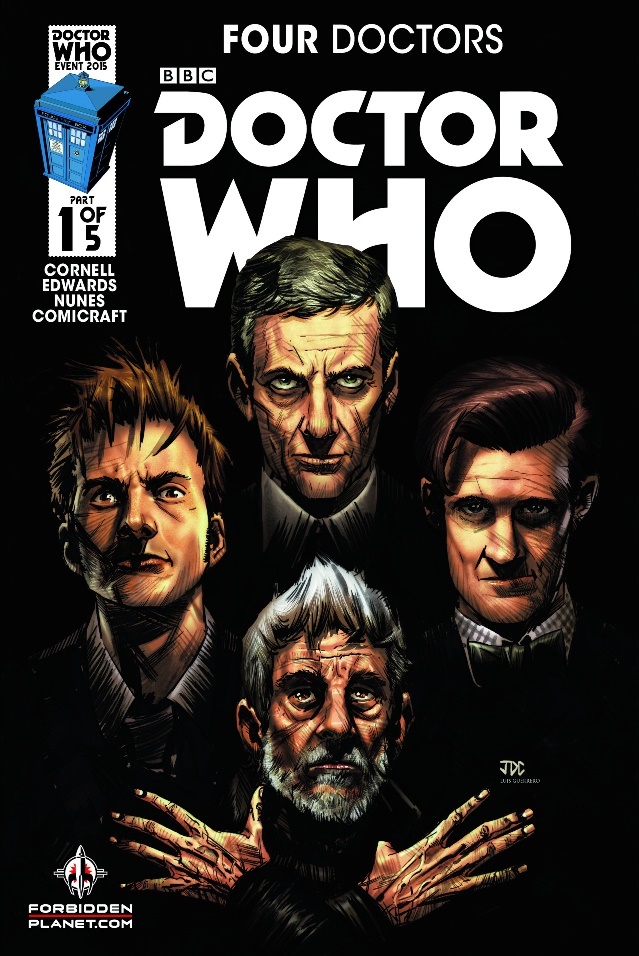
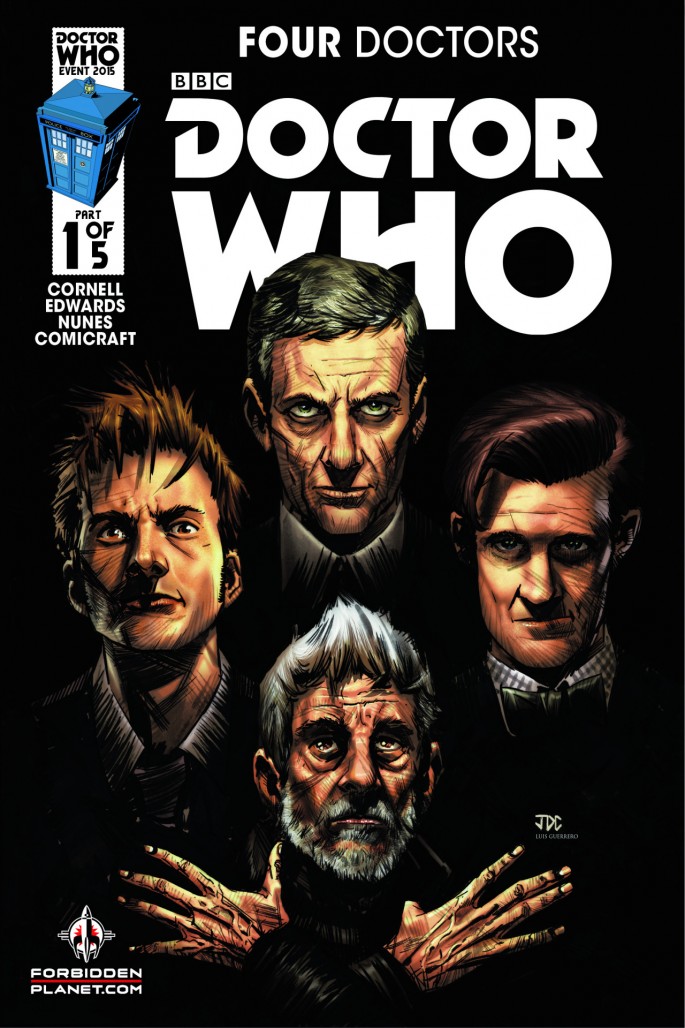
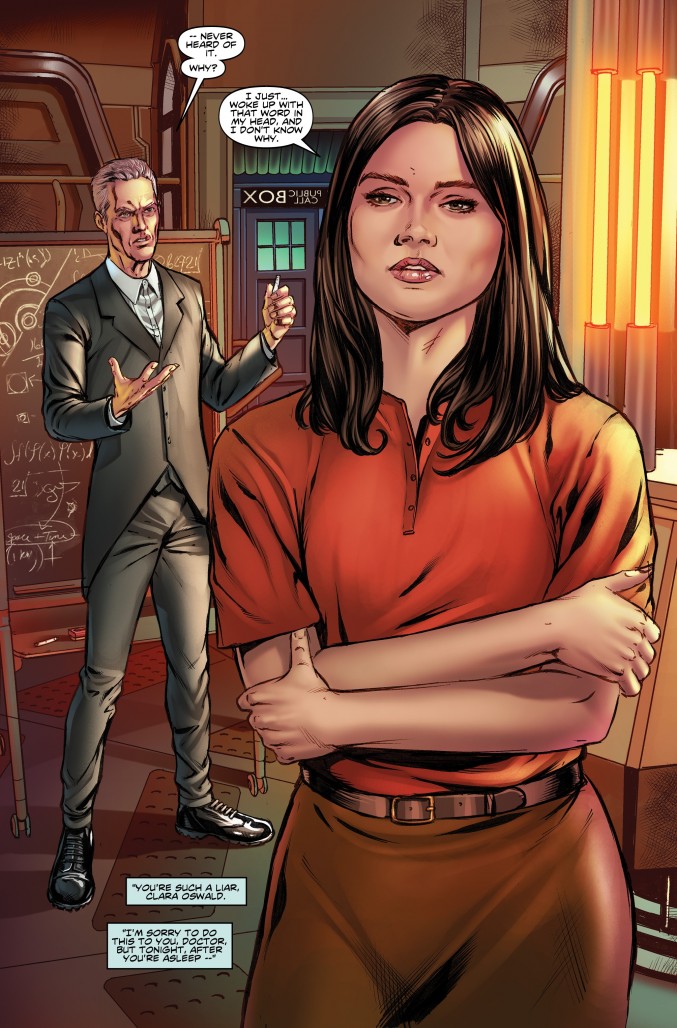
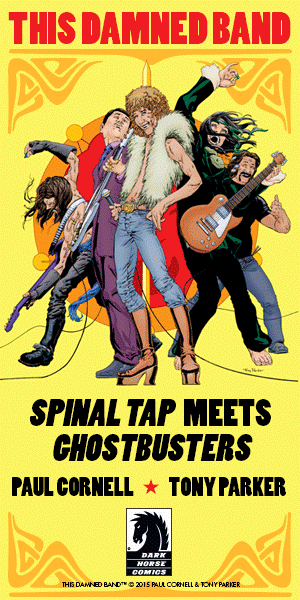
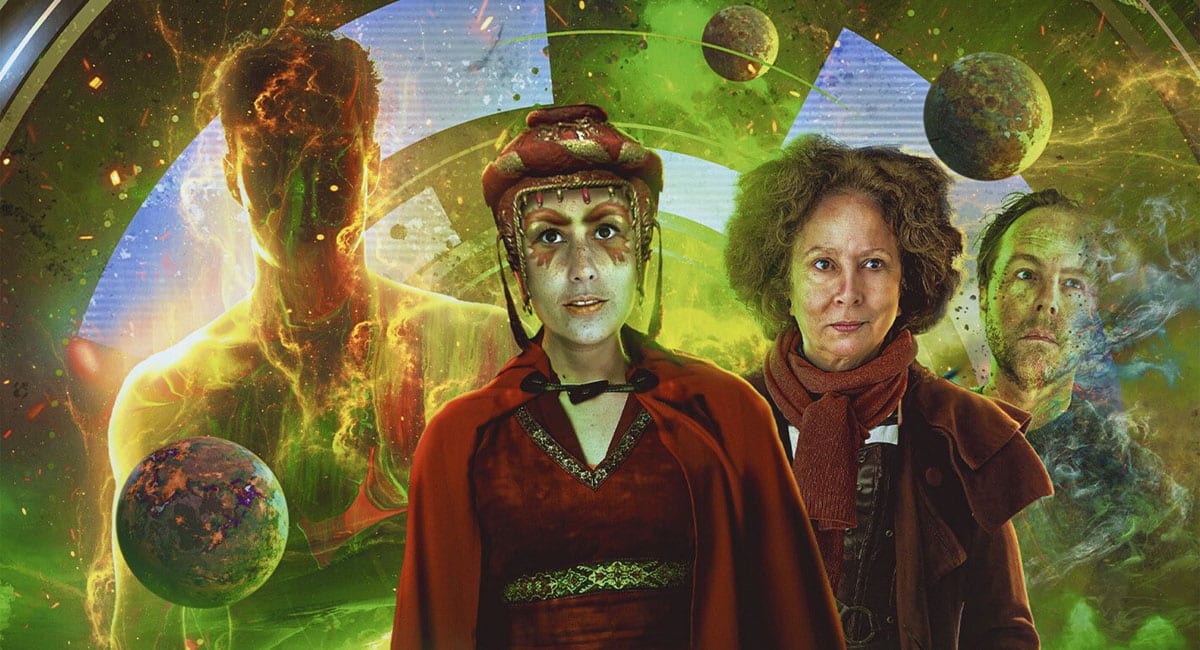
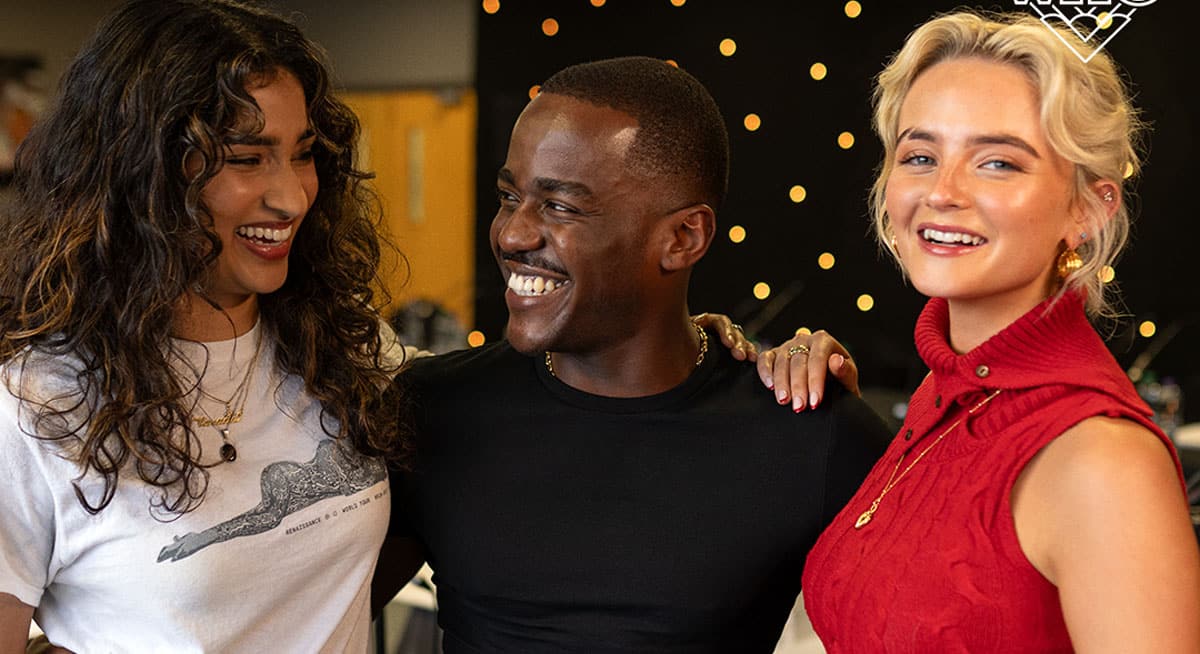
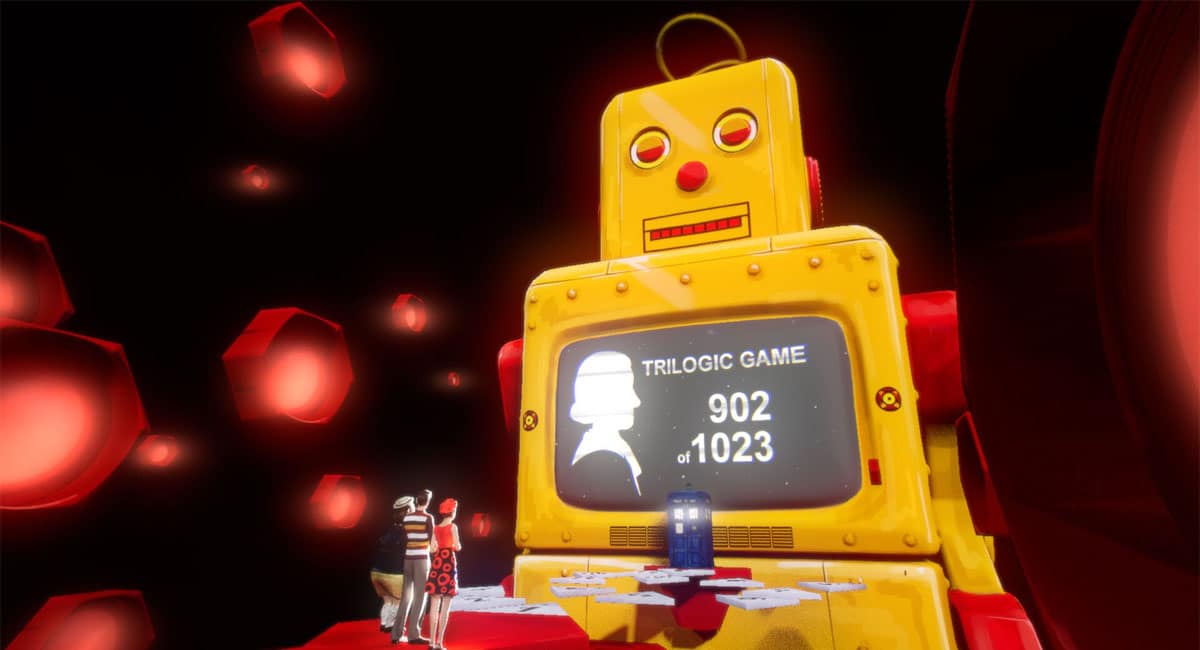
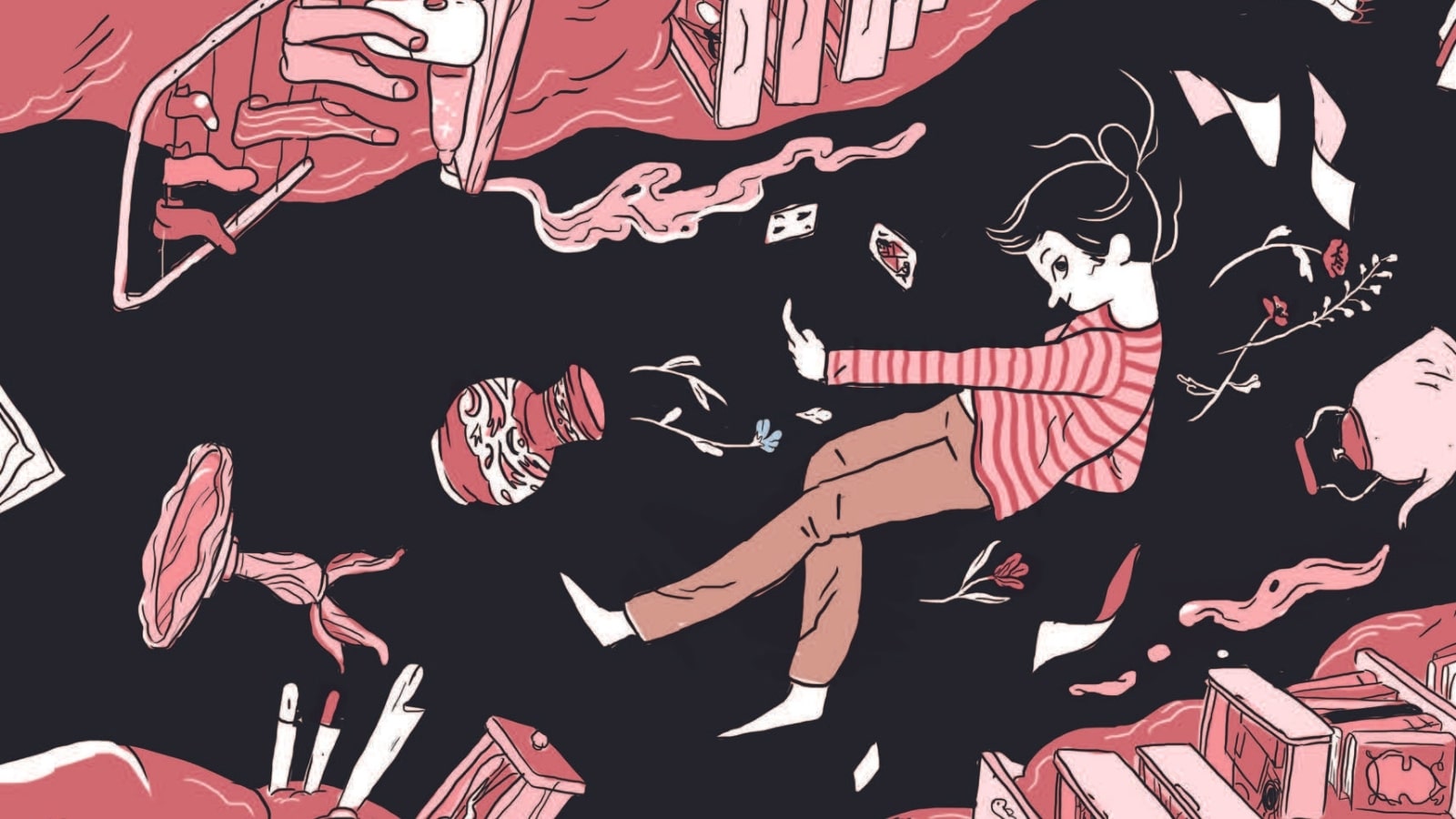

Great to read this.
Comments are closed.